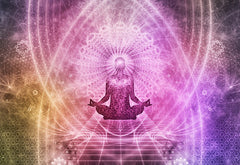 Fragrances can have a strong effect on our minds because they have the ability to conjure up even long-forgotten memories. Each time we inhale a scent, it travels up the nose where it is captured by the olfactory membrane. Each scent molecule neatly fits into a specific receptor cell that lines the olfactory epithelium. The scent molecules stimulate the lining of nerve cells which trigger electrical impulses to the gustatory center (where the tastes are perceived) and the amygdala (where emotional memories are stored) as well as other parts of the limbic system of the brain. When we first experience a smell, we immediately correlate it to the event we are experiencing at the time, through a process known as “associative learning.” If the experience is a pleasurable one, we will, whether we are consciously aware of it or not, interpret the smell and react positively. If the experience at the time is a negative one, we will always react to that smell with negative feelings, again, either consciously or subconsciously. This is why we sometimes can’t even understand our own feelings, because we may have first come in contact with a particular odor at a very young age, or as we were highly focused on something else and didn’t deliberately register it. Scent-invoked memories typically do occur when we least expect it, such as when we chance upon an odor and discover that we are reacting it.
Fragrances can have a strong effect on our minds because they have the ability to conjure up even long-forgotten memories. Each time we inhale a scent, it travels up the nose where it is captured by the olfactory membrane. Each scent molecule neatly fits into a specific receptor cell that lines the olfactory epithelium. The scent molecules stimulate the lining of nerve cells which trigger electrical impulses to the gustatory center (where the tastes are perceived) and the amygdala (where emotional memories are stored) as well as other parts of the limbic system of the brain. When we first experience a smell, we immediately correlate it to the event we are experiencing at the time, through a process known as “associative learning.” If the experience is a pleasurable one, we will, whether we are consciously aware of it or not, interpret the smell and react positively. If the experience at the time is a negative one, we will always react to that smell with negative feelings, again, either consciously or subconsciously. This is why we sometimes can’t even understand our own feelings, because we may have first come in contact with a particular odor at a very young age, or as we were highly focused on something else and didn’t deliberately register it. Scent-invoked memories typically do occur when we least expect it, such as when we chance upon an odor and discover that we are reacting it.
Science has determined that feelings that are associated with certain events can actually be passed down from mother to child. In one such study, female rats were conditioned to fear the smell of peppermint before they became pregnant. Their babies were then exposed to the minty scent along with a scent of their mother’s reacting to the odor. The rat babies learned to fear the smell even when their mothers there, and after only a single exposure. It is interesting to note that after the activity of the amygdala was blocked, the babies did not learn to fear the smell of peppermint. The scientists interpreted the studies’ findings as evidence that “infants can learn from their mothers about potential environmental threats before their sensory and motor development allows them a comprehensive exploration of the surrounding environment.
Smells can quickly change a person’s mood
Fragrances comprised of purely natural ingredients can have profound influence over our bodies because the limbic system is directly connected to the parts of the brain that control heart rate, blood pressure, breathing, stress levels, and hormone balance in addition to memory. Of our five senses, it is only our sense of smell that links directly to the limbic system. Fear, anxiety, anger, happiness, and sadness all come from this region of the brain – our emotional center. It is because of this that we recall certain memories or experience different emotions sometimes before we are even consciously aware of why. It is widely accepted among medical professionals that smells can change a person’s mood faster than anything else!
Aromatherapy has been studied extensively and has been proven to enable us to harness the power of scent to bring about physical and emotional reactions. One review of 16 randomized controlled trials proved that the anxiety-inhibiting effects of aromatherapy among people experiencing anxiety indicated that it lessened the severity of the symptoms and with no adverse effects.
Aromatherapy and Anosmia (Loss of Smelling Ability)
Aromatherapy is still useful in those who have lost their sense of smell. Think of a lit cigarette and realize that the effects of the nicotine and smoke still can cause health issues, whether one can smell the tobacco burning or not. Having the ability of smell is of no importance. Aromatherapy will work, regardless. You may not have the ability to enjoy the aroma, but the natural constituents still exert their effects on the brain.
The First Association between Scent and Memory
 In ancient Yoga texts, Hindu wisdom first associated the sense of smell with memory and the Muladhara (root) chakra. Chakra is a Sanskrit word meaning “wheel” or “disc,” there are seven main chakras, or energy centers, which are located in the astral body – connecting the physical with the astral worlds – and they cannot be seen with the physical eye. Each chakra corresponds to a different level of cosmic creation and is related to a specific plane of consciousness and element, which gives it its unique characteristics. These metaphysical vortexes have the ability to transform energy both from and toward the astral body. The chakras start at the base of the spine and continue to the crown of the head. To visualize a chakra, simply imagine a spinning wheel of energy where physical matter and consciousness blend. This invisible energy is called “prana” or “life-force” and enables us to feel healthy, and vibrant, and keeps us alive. Knowing that our mind, body, and soul are all inter-connected, it is vital that we do all that we can to keep our chakras open and the energy flowing freely. When a chakra is blocked, the energy cannot flow, and it affects all of our other chakras.
In ancient Yoga texts, Hindu wisdom first associated the sense of smell with memory and the Muladhara (root) chakra. Chakra is a Sanskrit word meaning “wheel” or “disc,” there are seven main chakras, or energy centers, which are located in the astral body – connecting the physical with the astral worlds – and they cannot be seen with the physical eye. Each chakra corresponds to a different level of cosmic creation and is related to a specific plane of consciousness and element, which gives it its unique characteristics. These metaphysical vortexes have the ability to transform energy both from and toward the astral body. The chakras start at the base of the spine and continue to the crown of the head. To visualize a chakra, simply imagine a spinning wheel of energy where physical matter and consciousness blend. This invisible energy is called “prana” or “life-force” and enables us to feel healthy, and vibrant, and keeps us alive. Knowing that our mind, body, and soul are all inter-connected, it is vital that we do all that we can to keep our chakras open and the energy flowing freely. When a chakra is blocked, the energy cannot flow, and it affects all of our other chakras.
Muladhara Stick Incense
Through educated and inspired design, Prabhuji’s Gifts has created a complete line of chakra-beneficial, natural incense. The Muladhara Stick Incense incorporates each of the above-mentioned beneficial botanicals, and burning the incense specifically stimulates the root chakra and brings it into balance. As the fragrance spirals through the air, the user inhales the formulation crafted from ancient wisdom and is immediately connected to the element of earth. The balancing that occurs increases the sense of security, survival, and confidence. Any sense of dis-connectedness or loss of equilibrium vanishes. As the chakra that acts as the foundation for all the other chakras, it is imperative that it be in balance. The use of aromatherapy via inhalation of pure and natural incense is an ideal method to bring about openness and allow the energy to freely flow. Muladhara incense is a perfect mingling of the natural botanicals and likely to be the first experience one has with the beautiful fragrance. This initial positive experience will forever bring about feelings of total serenity and peacefulness!
A scientific study has revealed proof that incense actually boosts the brain's alpha waves and increases the mind's ability to disassociate from our bodies. Prabhuji's Gifts understands this, and has a complete line of stick incense (Chakra Line) that is formulated using all-natural ingredients to open and stimulate the flow of each chakra.
Attar Perfume OilsSufi masters used to choose special fragrances, called Attar Oils that had different spiritual and inspiring effects. The word “attar” is derived from the Persian word “atr,” meaning “essence” or “sweet fragrance.” When disciples arrived to meet their master, they smelled this beautifully scented perfume in the entrance. Because aromas make strong impressions and have the ability to transport us to moments that have passed, disciples would bring small bottles of these attar oils whenever they had to travel far away from their master. They would then apply the master’s special oil to invoke their presence before any spiritual practice or dance whirling. Mentally and spiritually transformative, these exotic fragrances have since been used throughout the East by men and women for thousands of years to enhance spirituality. Worn as sacred perfumes by Hindus and Buddhists during meditation, there are a great many references to these oils in Sanskrit literature. Sanskrit is the original language of Hinduism, and the references reveal that oils were crafted in ancient India by placing holy flowers and sacred plants into water or even vegetable oil. The earliest attar distillation is mentioned in the Charaka Samhita, a piece of Ayurvedic literature that explains that cosmetics and perfumes were made primarily for worship and for sensual enjoyment.
Fragrant works of art, the seven attar oils offered also by Prabhuji’s Gifts offer proven aromatherapy benefits as well as the ability to enhance meditation practices and spiritual pursuits. Crafted from naturally aromatic ingredients, they serve to attract positive vibrations of love, bliss, purity, vitality, protection, and inner awakening. These exotic fragrances will last the entire day, and are crafted strictly from ingredients that are permitted by the International Fragrance Association. Packaged in a jewel-like bottles that are decorated with artwork reminiscent of India, each bottle perfectly reflects its unique and exotic aroma.
Tilak is the holy dust of the places where Lord Krishna enjoyed his pastimes 5,000 years ago. Devotees wear tilak on their foreheads as a means of showing devotion to the Lord. Tilak Attar Oil is crafted from juicy orange, concord grape, sweet saffron, rosewood, vanilla, and almond to ignite feelings of blissful love and a gorgeous scent that will last for many hours.
Manjari Attar Oil imparts protection. Manjaris are the small, purplish flower-buds of the Tulasi plant. Because they are so delicate and beautiful, Lord Krishna is quite pleased whenever they are offered to him. Featuring the essential oils of gurjum, balsam, guaiacwood, amyris, myrrh, clary sage, cedarwood, lime, tobacco, and patchouli, just a tiny amount applied to the pulse points will last for hours as the scent gently unfolds…
A unique, Oriental fragrance, Jugala Attar Oil features bright citrus notes that sparkle above a heart of orange blossom, geranium, and fresh herbs. Notes of patchouli, sandalwood, and cedarwood complete the intriguing fragrance that promotes purity when applied to the pulse points.
Red berries, violet, peony, muguet, geranium, sweet amber, leather, and musk comprise Prema Attar Oil. Prema is a Sanskrit word that means “divine love.” It is the power of love that frees us from our chains and transforms our shackles into wings, because we are truly free when we are seized by love. This delightfully fragrant oil promotes feelings of pure bliss.
Vitality-enhancing Jiva Attar Oil is a rich blend of gardenia, sweet jasmine, orange blossom, plum, and further harmonized with the addition of balsam accord and rainforest leaves. The scent continues to develop as you wear it, increasing vibrancy and vigor.
 Designed to enhance enlightenment, Atma Attar Oil delights with lime, violet, patchouli, cedarwood, cinnamon, fir, and amber. Atma is the Self – the essential plane that expresses Itself as diversity; the One becoming many, the Unity manifesting as multiplicity.
Designed to enhance enlightenment, Atma Attar Oil delights with lime, violet, patchouli, cedarwood, cinnamon, fir, and amber. Atma is the Self – the essential plane that expresses Itself as diversity; the One becoming many, the Unity manifesting as multiplicity.
Padma Attar Oil encourages awakening with a sophisticated bouquet of floral notes. Padma is the Sanskrit name of the sacred water lily, also known as the lotus flower. While its roots lie under the mud and water, its beautiful flower unfolds above the water’s surface, representing the awakening of the soul to its spiritual and eternal nature.
Each carefully crafted Attar Oil is indeed a fragrance for the soul that magically transports you to a different time and place, feeling and emotion, and forever links you with the ancient masters.

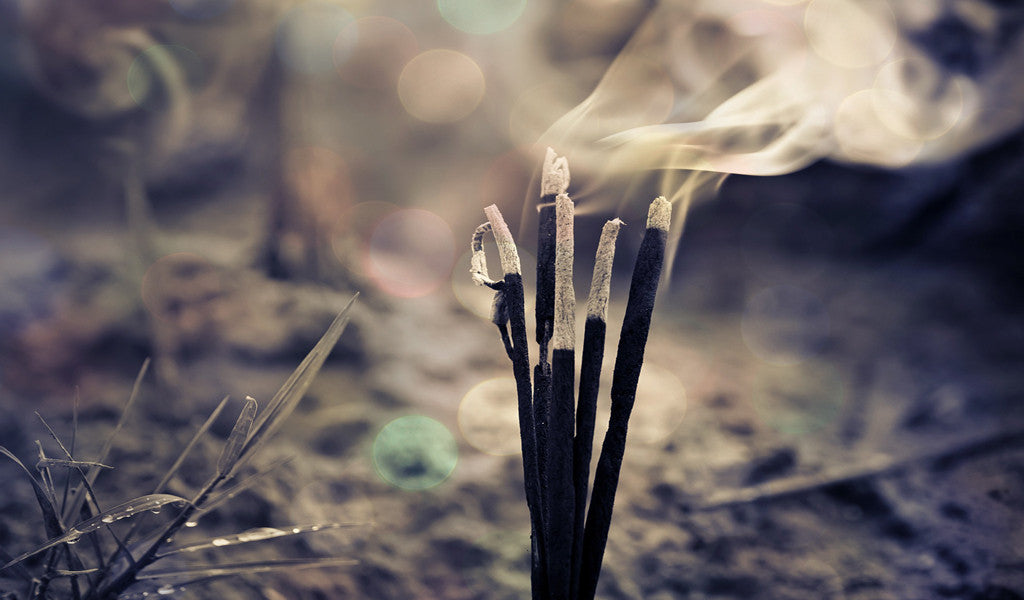
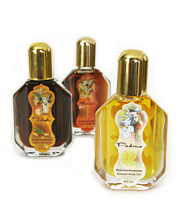

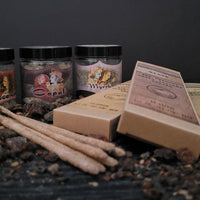
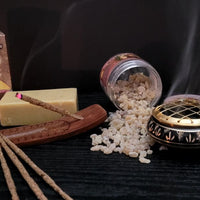
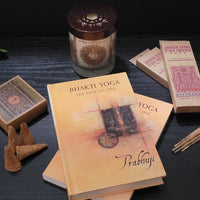
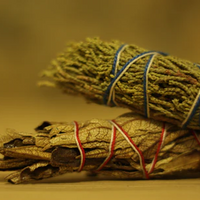

0 comments